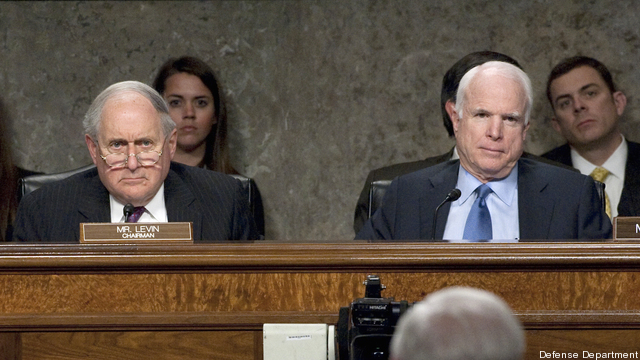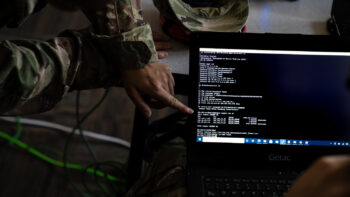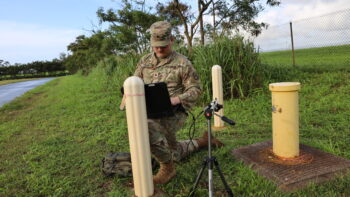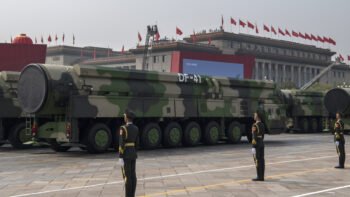
THE CAPITOL [updated 9:40 pm with details from Senate press release]: The Senate Armed Services Committee unanimously passed its mark-up of the annual defense spending bill, rejecting all proposed cuts to the Air National Guard, cutting the Defense Department’s civilian and contractor workforce by 5 percent over five years, and restricting aid to Pakistan.
The bill is silent on detention of terrorist suspects.
The Senate added $777.8 million in advanced procurement funds to restore the second Virginia-class attack submarine the Administration cut from the 2014 building program, authorizing use of “incremental funding” — a budgeting trick normally reserved for aircraft carriers — to spread out the cost, an expedient likely to find favor with both the Pentagon and the House of Representatives. However, the committee adds no funds to keep operating the Block 30 Global Hawk unmanned air vehicles the Administration wants to mothball, setting up a potential conflict with the House, which ordered the Air Force to keep flying the drones and added $260 million to fund their continued operation.
The Senate also added $159.5 million to meet a Special Operations Command “unfunded requirement” for intelligence, surveillance, and reconnaissance (ISR)
To make these and other additions while staying within the President’s requested topline of $550 billion, the bill would cut $660 million from military housing projects, $200 million from the Joint IED Defeat Organization (JIEDDO), and $200 million from the Commander’s Emergency Response Program (CERP) fund for Afghanistan, a 50% cut, on the grounds that US force are withdrawing, although it does fully fund the much larger request of $5.7 billion to build up the Afghan army and national police so they can better take over as the Americans leave.
Like the House, the SASC rejected the administration’s proposal to increase fees for Tricare, the health plan for military servicemembers, retirees, and their dependents. The SASC also joined the House in rejecting the Army’s request to shut down the M1 Abrams tank production line and used the money requested for the shut-down to upgrade the tank fleet and buy M88 Hercules recovery vehicles (which tow broken-down tanks) instead, with SASC Chairman Carl Levin saying the committee “felt that money should be spent to produce something that actually has a use, rather than close down a line and then reopen a line a year or two later.”
Unlike the House, the Senate bill does not call for a third missile-defense site on the East Coast, though it does order an assessment of the need for one. It does add $210 million or the Israeli “Iron Dome” missile defense system, a measure the House also took and which the Pentagon has endorsed, as well as $100 million for other US-Israeli missile defense projects. As for America’s own missile defense projects, while fully funding the Administration’s $9.7 billion request for the Missile Defense Agency, it makes significant changes, zeroing out funds for the MEADS system — a $400.9 million reduction — while adding $100 million to THAAD.
All told, committee members made about 150 changes to the President’s budget proposal but stayed within its $550 billion topline, unlike the House, boasted Levin and the SASC’s ranking Republican, John McCain, in a press conference this afternoon. They did not mention their bill is still $4 billion over the maximum imposed by the Budget Control Act.
Levin hammered the Air Force, whose arguments for the proposed cuts to the Air Guard were not “the least bit convincing,” he said. “The Air Force reductions were totally out of proportion,” hitting the Air Force Reserve and Guard far harder than the regular active-duty force, “unlike the Army, unlike the Navy, unlike the Marines, where there were proportionate reductions.” Levin said the Air Force botched the proposed cuts so badly that he never wants to see a decision “made with as little care as this one” ever again. Instead, the SASC bill calls for “a national commission on the structure of the Air Force” which will make non-binding recommendations to Congress by March 31st, 2013.
In the meantime, Levin said, “we decided we just better put a freeze on this for the year.” Unlike the House, however, the SASC did not forbid the Air Force from retiring aging aircraft across the board, and Levin in particular said the service could go ahead and retire expensive C-5A Galaxy transports — as long as doing so did not adversely impact the Air Guard.
“Never underestimate the influence of the National Guard,” McCain added.
McCain saved his harshest words for Pakistan, saying he was “outraged” by the “ludicrous” and “outrageous conviction of Dr. Shakeel Afridi for providing information that helped the US track down and kill Osama Bin Laden,” saying the 33-year prison term amounts to a death sentence. McCain also denounced as “extortion” the Pakistani government’s requests for fees to allow US supplies to transit its territory on their way to Afghanistan.
Not only does the SASC bill cut aid to Pakistan, it also puts a hold on any reimbursements to the Pakistani military for its fight against terrorists and insurgents until the Secretary of Defense certifies that the Pakistanis have fully reopened US supply lines, released detainees like Dr. Afridi, and ceased all support to militant groups in Afghanistan such as the infamous Haqqani network — although Levin noted that the bill permits a “national security waiver,” a term of art for letting the Administration ignore the provision if it wants to.
On the home front, McCain said the bill would cut the Defense Department’s civilian staff and spending on contractor personnel by five percent over five years, which they said would save billions and reduce the non-uniformed workforce in rough proportion to the cuts in the uniformed military.
Levin said the bill is formally on the list for the full Senate to consider in June, though it may slip to July.
From Boeing’s struggles to inflation relief funds: 5 industry stories from 2024
Making a year-end list in which she forces references to Taylor Swift songs for no reason has basically become reporter Valerie Insinna’s favorite Christmas tradition.


























